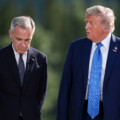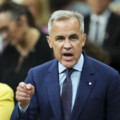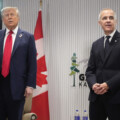This is The Week in Polling, your Saturday dose of interesting numbers from top pollsters in Canada and around the world, curated by The Hub. Here’s what we’re looking at this week.
Poilievre and Carney are nearly equally trusted to manage U.S. relations and defend against Trump
When asked who they trust most to manage relations with our neighbour to the south and defend our interests against President Trump, Conservative Party leader Pierre Poilievre and Liberal Party leadership hopeful Mark Carney are nearly tied at 22 and 20 percent, respectively. Ontario Premier Doug Ford and Prime Minister Justin Trudeau follow at 9 percent each. They are ahead of former deputy prime minister and Liberal leadership candidate Chrystia Freeland, NDP leader Jagmeet Singh, and Alberta Premier Danielle Smith.
“[Canada] will never be the 51st state,” said Poilievre at his Canada First rally last weekend in Ottawa. “[Canadians] will bear any burden and pay any price to protect the sovereignty and independence of our country.” Later in the rally, Poilievre pointed out that Canadian legacy media had been repeating the narrative that he should completely alter his policy platform and message because of Trump’s tariff threat. He vehemently disagreed with their advice.
“The Trump tariff threats have proven Conservatives right on everything,” said Poilievre during his remarks. “Conservatives were right on the Liberal capital gains tax hike and the carbon tax, on pipelines, on LNG, on fentanyl, the border, immigration, and the need to celebrate rather than cancel our proud history and country.”
In an interview on the CBC, when asked about his plan to combat Trump’s tariffs, Carney said, “We can’t control Trump, but we can control what we do here at home to reinforce our economy.” He explained that his plan involved middle-class tax cuts, investing in infrastructure, building new trade routes, and having one Canadian economy instead of thirteen.










